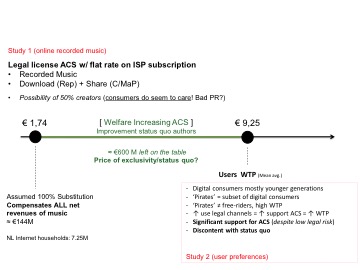 Since 2012 a multidisciplinary research group at the Institute for Information Law (IViR), University of Amsterdam has been conducting a large-scale empirical study of Alternative Compensation Systems (ACS). In simple terms, ACS are legal mechanisms that for a small monthly fee would authorize non-commercial online uses by individuals, including the downloading and sharing of protected works (such as music, films, and books), while compensating rights holders.
Since 2012 a multidisciplinary research group at the Institute for Information Law (IViR), University of Amsterdam has been conducting a large-scale empirical study of Alternative Compensation Systems (ACS). In simple terms, ACS are legal mechanisms that for a small monthly fee would authorize non-commercial online uses by individuals, including the downloading and sharing of protected works (such as music, films, and books), while compensating rights holders.
On Saturday, 11th of July, 2015, we will present our results in Amsterdam, and discuss the implications of our findings in three high-profile panels examining the economic, socio-political and legal aspects of ACS . (You can access the program and register here)
In broad strokes, our results suggest that:
• Consumers are dissatisfied with the currently available legal access channels, and consequently, different forms of ACS are supported by the majority of the Dutch population.
• An ACS, if implemented, would provide extra revenues to music and audio-visual rights holders as compared to the status quo.
• It is possible to include lay people in highly complex copyright policy decisions.
The empirical research was based on two surveys conducted in November 2013 with a panel constituted by a representative sample of the Dutch population, aged 16+, including those with and without Internet. The first survey regarded individual media consumption habits for three types of content – music, audiovisual and books – in relation to different online and offline (lawful and unlawful) channels. In the second survey we conducted a discrete choice experiment, defining the ACS payment mechanism as a surcharge on the Internet subscription fee of households, and the functioning of the system under statutory regulation. Different types of ACS were defined through a combination of attributes abstracted from legal analysis of existing proposals: allowed uses, subject matter, catalogue completeness, monitoring, distribution of revenues and price.
Although the analysis of the survey data is ongoing, it is possible to report the results of research as they apply to a mandatory ACS on the rights holders side and user-side, which would translate into a remunerated legal license to the rights of reproduction and communication/making available to the public.
In a recently published paper we used the results of our research to examine whether an ACS for recorded music would be welfare increasing. Our main findings were the following.
• A well-designed ACS for recorded music makes users and rights holders better off, increasing their total welfare compared to the status quo by about increasing their total welfare compared to the status quo even when the results are corrected for overestimation, in the best case by about €600 million.
• A €1.74 surcharge on ISP subscription for all households with Internet connection would equal the entire revenues in the Dutch physical and digital market for recorded music in 2012, including all conventional purchases of recorded music of approximately €144 million.
• Users’ willingness to pay (WTP) is €9.25 for a mandatory ACS, despite low-risk associated with private copying from unlawful sources (as the survey preceded ACI Adam – analysis here) and widespread availability and use of online music subscription platforms.
• Results were calculated on the basis of a 100% substitution effect of the net revenues of rights holders identified above. Even if our measured 9.25 WTP overestimates the actual WTP by a factor of 3, the ACS based solution would provide more revenue for the Dutch recorded music industry than what it currently makes.
• Though we made calculations under the assumption that an ACS would substitute all physical and digital purchases as well as all streaming revenues, in practice this assumption is unrealistic, resulting in us significantly underestimating the possible welfare gains of the system.
• For rights holders in general, there will be economic advantages of monetizing previously unenforced and uncompensated uses, as well as savings in copyright enforcement. For authors, a mandatory claim of fair compensation (e.g. 50% of collected sums) would prove a substantial improvement over the status quo.
In an upcoming paper (currently under review) we studied whether the idea of an ACS enjoys public support in the Netherlands and attempted to identify how that support is structured. Our main findings were the following.
• Five significant groups of consumers were identified in the data through cluster analysis: non-consumers, bookworms, occasional consumers, digital consumers, and pirates.
• Nearly half (49%) of Dutch consumers do not use digital access channels to consume music, audiovisual content and books. This is mostly due to hold-out groups, characterized by older less educated people that do not consume culture (non-consumers, 29%) and older educated people who prefer print (but not e-)books (bookworms, 20%).
• Age is the dividing line for digital uses. Younger generations show “promiscuous” consumption patterns that include use of free/paid and legal/illegal channels. They can be divided into the following clusters: occasional consumers (28.88%), digital consumers (6.36%), and pirates (16.02%).
• Occasional consumers are infrequent and low intensity digital consumers, mostly focused on free sampling (complemented by purchase of physical copies).
• Digital consumers and pirates account for a disproportionate large share of the overall cultural consumption, and it is almost impossible to separate pirates from digital consumers. Indeed, pirates are a subset of digital consumers.
• There is substantial consumer support for ACS, especially among those already using legal access channels, namely pirates and digital consumers, but also occasional consumers. In fact, increased usage of legal channels indicates increased inclination to support ACS, and higher WTP.
• The likely reason is discontent with the status quo. Possible sources of discontent are linked to the insufficiencies of current offers in what concerns allowed uses/user rights and subject matter/types of content. In a nutshell, users want to be able to do more than download or stream music (established as the baseline model); they desire the freedom to share (make available) that extends to additional content, offered to them by piratical channels.
In a recent presentation at the 2015 ALAI Conference I attempted to represent the essence of these results in the following slide (paper can be found here).
In a time of copyright reform in the EU this IViR research project provides important empirical research that may inform the political debate and legal analysis with concrete evidence. Chief among the findings are the willingness of users to pay for and participate in an ACS, its quantification and, using the case-study of recorded music, the realization that such a model by far and large holds the promise of being welfare increasing. It also illuminates the significant amount of remuneration rights holders and especially creators – due to their weakened bargaining position – have left on the ‘virtual’ table. In other words, the price of exclusivity.
For all those interested, we look forward to welcoming you in Amsterdam in July 11 for what promises to be an exciting debate! (attendance is free, but don’t forget to register)
_____________________________
To make sure you do not miss out on regular updates from the Kluwer Copyright Blog, please subscribe here.
Kluwer IP Law
The 2022 Future Ready Lawyer survey showed that 79% of lawyers think that the importance of legal technology will increase for next year. With Kluwer IP Law you can navigate the increasingly global practice of IP law with specialized, local and cross-border information and tools from every preferred location. Are you, as an IP professional, ready for the future?
Learn how Kluwer IP Law can support you.




